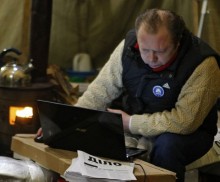An online and offline hackathon, Transparency Is the Citizen’s Instrument, was launched in the worldwide Web on February 24. “The Internet hackathon’s mission is to develop, implement, and popularize IT instruments that will help society and citizens at a transitional stage in the making of a new state. The basic principle is initiative and self-organization. We have a behavioral model – the Maidan. This group has no restrictions on creative and ‘main’ ideas – please suggest and put into practice all that you think is useful for society,” the initiative’s official website says.
Valerii Yavtushenko is the project’s chief coordinator.
The community also has its coordination center, Maidan-Hackathon, in Facebook. One can read here, as well as on the official website (http://maidan-hackaton.github.io/) detailed instructions on how to join the initiative, suggest an idea, and find like-minded people. Maidan-Hackathon comprises groups that deal with coordination, moderation, training of IT users, project analysis, search for contact points to speed up project implementation, as well as a group to criticize and put up proposals about the received ideas.
In the two days of the hackathon, activists put forward more than 120 ideas on the computerization of governance and monitoring of the work of governmental officials, including video reports of MPs on their performance, electronic passport, a corruptionist search resource, and corruption prevention IT system.
The Day offers the reader the hackathon’s most interesting, in its view, ideas. Naturally, this list is being constantly updated, and new, no less interesting, ideas are certain to emerge in the course of time.
1. OPEN BUDGET. The idea is to establish a service in order to keep track of budget distribution, with details about a concrete office, and the number of purchased things, with reference to bids and places of purchase. For it is practically impossible now to track the detailed distribution of budgetary flows in this country. What is in open access is only the budget law for each specific year, which discloses only the funds allocated to or received from governmental institutions. IT specialists have already partially carried out a similar project.
2. ELECTRONIC PASSPORT. It is a chip that can be inserted into various devices (watch, telephone, USB adaptor). The gadget will only function if it bears the owner’s fingerprint and is coupled with the national human database. This makes it possible to immediately get online access to and print out governmental documents. The device can be also used in the electronic voting system and for expanding database capacities. For example, firemen can issue an SOS signal, medics can take biometric readings and statistics, and the military can use it as attachment to a 3D navigator. Yet the project is so far in the shape of an idea.
3. VISUAL RECORD OF POLITICIANS’ ACTIONS (http://persony.info) is a resource that keeps a visual record of politicians’ actions. The idea’s authors believe this will keep us from forgetting, in the course of time, the actions and promises of politicians.
Video report is a similar idea. Its author suggests that, after a Verkhovna Rada session, each MP should come up to the camera and report on what for and why he voted. Then, according to the authors, it will be easy to check the history of each MP before the next vote.
4. THE AUTHORITIES OVERSIGHT DEPARTMENT. It is supposed to help investigate corruption schemes. The staff of this department is to be equipped with a GPS navigator which will display all his activities online. So anybody can enter the Internet and see what the observers are doing.
5. CORRUPTIONIST SEARCH SYSTEM. It analyzes the cost of the property of a governmental official and his family in comparison to his or her recorded earnings. The coefficient is calculated on a 100-point scale.
“There were some urgent requirements of the Maidan, and people have begun to meet them,” says Oleksandr Inerren, one of the IT tent’s and the hackathon’s founders. He launched his first IT tent hackathon later last year. “The essence of a hackathon is that creative IT specialists gather to discuss ideas and put them into practice as soon as possible,” he says. In his words, it is very important now to see that it is a pressing idea. “We have stopped dealing with minor projects, for they cease to be important very fast. For example, we have already funded a transparent project and will try to carry it out in governmental offices. We are now working on the electronic democracy project,” Inerren says. The electronic democracy project will be submitted in the near future.
COMMENTARY
Yehor ANCHYSHKIN, founder of Viewdle and Zakaz.ua:
“In my view, all the proposed projects are good and timely. Of course, not all of them will be carried out. But it is quite possible that the people who failed to implement their own projects will help others come together and create something on a wider scale.
“I personally welcome, above all, the projects that expose corruption in any way. It is important that all should know who and how much takes. But there are many nuances here. For example, if we set up a resource which will receive anonymous information on who gave or took a bribe, it will be still difficult to find out the extent to which this information is authentic because the anonymous informer will not disclose his name. But all this can be thought out well and put into practice.
“Therefore, if I could focus on a concrete pressing problem, I would choose the anticorruption project. For I think it is still an urgent problem in spite of all the ongoing changes, even though there are some people who are frightened.”







